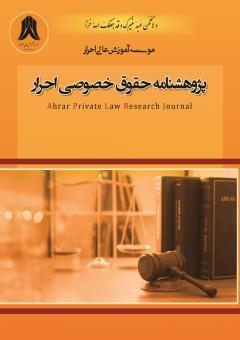The role of technology in the process of investigation
Subject Areas : Civil LawMaryam Ahmadi 1 , Matin Bazyar 2
1 - Master's student in Private Law, Department of Private and Islamic Law, Faculty of Law and Political Science, University of Tehran, Tehran, Iran.
2 - Master's student in Private Law, Department of Private and Islamic Law, Faculty of Law and Political Science, University of Tehran, Tehran, Iran.
Keywords: Information technology, communication technology, court, civil procedure ,
Abstract :
Today, Information technology has penetrated all sectors of society and its impact on the advancement of processes is significant. The judiciary and the prosecution are not exempt from this and application of technology in this area is popular all over the world. Although discussion on the possible use of technology in this sector is not very old but from the beginning it has been met with reception and introduction of proposals in various areas, in order to better use in the administration of justice. Our country is also not far behind and use of technology in the judiciary is following up with related laws and regulations. The necessity of application in this section has been the subject of many studies and articles and some Recommendations has been provided for use in proceedings that they has been more in the field of criminal procedure. However Study about the issue that technology specifically in which procedural steps and sections could be used or not, is novel and although necessary to know. In this article, by investigating details of civil procedure form and looking in to each parts from possible use or non-use of technology, effort has been to inaugurate an opening to offer new recommendations.
1. Regulations on Electronic Judicial Services, approved on 2012 by the Head of the Judiciary, Official Gazette of the Islamic Republic of Iran, Year 68, No. 19597, dated 2012. [In Persian]
2. Doroudi, F. (2010). Applications of Information Technology: Strategic Planning for Information Technology, in: Ketab-e-Mah-e-Elm va Fan, No. 125. [In Persian]
3. Rahmatollah, Gh. (2004). The Impact of Information Technology on Organizational Structure and Workforce Structure, in: Farhang-e-Modiriyat, No. 7. [In Persian]
4. Rahmatollahi, H and Rezvan, Z. (2011). Emergence of Virtual States in the Age of Globalization, in: Private Law Journal, Vol. 8. [In Persian]
5. Zarkalam, S. (2012). Electronic Trials: Necessities, Requirements and Challenges, in: Criminal Law Teachings, No. 3. [In Persian]
6. Shams, A. (2011). Advanced Civil Procedure Law, Volume 2, Tehran: Darak Publications, 29th Edition. [In Persian]
7. Ghamami, M and Mohseni, H. (2013). Formal Civil Procedure Law, Tehran: Sherkat-e-Sahami-ye-Enteshar Publications, 3rd Edition. [In Persian]
8. Law on Criminal Procedure of Armed Forces and Electronic Trials, approved on 2014. Official Gazette No. 20297, Year 70, dated 2014[In Persian]
9. Mahdavi Pour, A. (2012). Methods of Protecting Witnesses Based on Communication Technologies, in: Jurisprudence and Communication Law, No. 3. [In Persian]
10. Mohseni, H and Rezaei Nejad, H. (2012). Judiciary and the Advancement of Information and Communication Technologies, in: Legal Studies Journal of Shiraz University, No. 2. [In Persian]
11. Mohammadian, S and Mohammadreza Pour, B. (2012). The Necessity of Establishing a Personal Identity File in the Criminal Trial Process in Iran, in: Legal Medicine Journal, No. 2-3. [In Persian]
12. Mohseni, H. (2006). The Concept of Procedural Principles and Their Interpretive Role and How to Distinguish Them from Procedural Formalities, in: Kanun va Vakil Journal, No. 192-193. [In Persian]
13. Mehr Afshan, A. (2011). Virtual Trials: A New Concept in Judicial Justice, in: Studies in Islamic Jurisprudence and Law, No. 5. [In Persian]
14. Mohseni, H. (2014). Civil Procedure Law in France, Tehran: Sherkat-e-Sahami-ye-Enteshar Publications, 3rd Edition. [In Persian]
15-Sheryl & MacDonald ,J.(2004).UsingThe Internet to Assist, court Processes :Delivery of Justice in an Electronic age,in: Reform 85
16- MC Kechnie, D.(2003).The Use of Internet by Courts and Judiciary: Finding From a Study Trip and Supplementary Resarch ,in: International Journal of law and Technology
17- . Miller, A R,Tucker, C,(2011). Electronic Discovery and the Adoption of Information Technology
18- Maes, Eric, M,B and De Man, C and Van Brakel ,R .(2012). Thinking about Electronic Monitoring in The Context of Pre-trial Detention in Belgium, in: European Journal of Probation University of Bucharest
19- MC Kechnie, D. (2003). The Use of Internet by Courts and Judiciary: Finding From a Study Trip and Supplementary Resarch ,in: International Journal of law and Technology, 2003.
20- Vlicogna, M and Yein Ng, G.(2006) .Legitimacy and Internet in the Judiciary: A Lesson From the Italian Courts’ Websites Experience, in:International Journal of Law and Information Technology
21- Heuvel ,E. (1997). Online Disput Resolution as a Solution to Cross-Bordr E-Disputes, in:law in a digital worid


